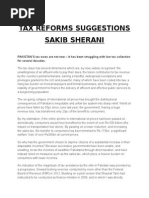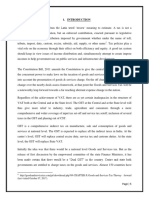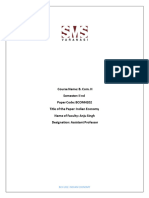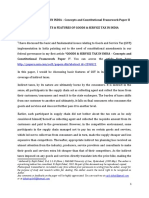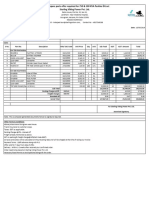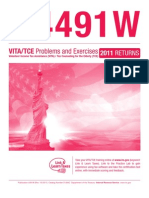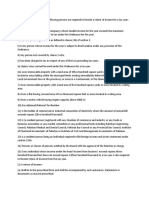BTT
BTT
Uploaded by
mandy021190Copyright:
Available Formats
BTT
BTT
Uploaded by
mandy021190Original Description:
Original Title
Copyright
Available Formats
Share this document
Did you find this document useful?
Is this content inappropriate?
Copyright:
Available Formats
BTT
BTT
Uploaded by
mandy021190Copyright:
Available Formats
BANKING TRANSACTION TAX
A bank transaction tax is a tax levied on debit (and/or credit) entries on bank
accounts. It can be automatically collected by a central counterparty in the
clearing or settlement process. Thus, a bank transaction tax is simply a tax of a
certain percentage levied on transactions that happen on a bank account. This
tax is usually collected by some central counterparty, for instance, a countrys
Central Bank, during the equities clearing procedures.
The proposal for a single tax is not new idea. Long back Physiocrats, an
economic school of thoughts that originated in France, mooted the idea of
levying a single tax on land. While the present tax system, comprising the
income tax, sales tax, VAT etc. are Anglo-Saxon in origin. In the 19th century,
Canada and the United States also discussed single tax. France discussed a
single tax in the post-war period, and in the 1990s, in Brazil this same proposal
reappeared in a new format, as a BTT. Battle lines are clearly been drawn
between two schools of thoughts in the annals of economic history.
Taxes are collected by governments to meet the expenditure of governance. The
tax income is used to pay for the salaries of government functionaries, other
operating expenses of the state, carrying out devolvement work and providing
public goods, such as law and order. However, the choice of taxes for different
governments at different times differ. India, for example, has a range of direct
and indirect taxes which, depending on the jurisdiction, are collected by both
the state governments and the central government. There has been a talk for
simplifying the tax structure and the tax administration in the country. Proposals
for a new Direct Taxes Code (DTC) in case of direct taxes and Goods and
Services Tax (GST) in case of indirect taxes are at different stages of
consultations.
KEY ISSUES IN TAX REFORMS, THE FOLLOWING FOUR ARE THE
MOST CRUCIAL:
1. Simplification of tax codes, getting rid of the problem of multiplicity of
objectives assigned to tax codes and multiple taxes.
2. Rationalisation, modernisation and human capital building of existing tax
collection machinery. Our present system still carries the remnants of the
old British and Soviet style tax systems which are divorced from the
ground realities of our market based economy.
3. Rationalisation and modernisation must be undertaken with objective of
reducing cost of collecting the taxes, compliance cost so as to minimise
distortions in resource allocation and reduce harassment.
4. The fourth and perhaps the most crucial, resolving the tensions between
Centre and States governments on matters of taxation.
IDEA OF BTT IN INDIA
The idea of the BTT first started when ArthKranti, a Pune-based non-
governmental organization focused on socio-economic issues, first proposed the
levy Interestingly, Arthakranti, a Mumbai-based non-governmental
organization, in a proposal (which is being widely discussed) calls for scraping
of all the existing taxes, except customs duties and replace it with a single tax
on banking transactions.
Arthakranti has proposed that all taxes, except customs duty, should be
withdrawn and be replaced by a single tax on banking transactions. The tax will
be deducted every time an account is credited. The BTT should replace every
single tax in the country barring customs duty. Apart from this, all cash
transactions above Rs 2,000 should not be legally valid (one cannot issue an
invoice on the same) though not criminalised. The government should also
withdraw Rs 500 and Rs 1000 currency notes from circulation.
For example, if the limit is set at Rs.2,000, any transaction valued above this
done with cash will not have any legal protection. So if people buy property by
paying in cash, they will not be able to legally transfer it in their name. This is
expected to bring in most transactions into the banking system and eliminate the
scope of black money. However, there will be no tax on cash transactions. It is
argued that this will simplify tax collection and tax administration processes,
and the numbers put out show that a transaction tax of less than 2% will be
sufficient to fulfil the revenue needs of the country. However, it will not be easy
to implement because of several difficulties such as lack of banking penetration
in the country. Also, a transaction tax will not be progressive. Further, every
stage of production, which involves transaction between two parties, will get
taxed and have an implication on total cost. Critics also argue that this will
undermine our federal system.
The proposal, abolishing of direct and other taxes and levy of single Banking
Transaction Tax (BTT) by Shri Baba Ramdev Ji (BRD) has reopened a very
important and forgotten chapter in the history of Indian economic reforms.
Reforms started in 1992 when the country first resolved to move towards a
democratic market based economic system from a democratic socialist
economic system. Tax reforms were a logical corollary of this commitment to
market based system. Tax reforms since 1992 were centred around two
important issues rationalisation of tax structures (both direct and indirect) and
fiscal federalism (sharing of tax revenue between Centre and states) in new
economic order. It not the purpose here to trace this history, but it will suffice to
say that progress made on both the issues was visible till 2001 after which it
ceased to gather much attention.
According to ArthKrantis calculations, at the rate of 2 percent per transaction,
this can result in net tax collections of Rs 40 lakh crore for the government,
compared to about Rs 10 lakh crore currently. The NGO says this could be
distributed among the central, state and local governments.
The could be the positives for such a tax
Firstly, the proposal aims to simplify (or, oversimplifies, according to
critics) Indias complicated tax system, and if nothing else, brings into
public conscience the need for reforms in the current tax system.
Second, it could potentially directly kickstart consumer spending by
doing away with income and a host of other taxes while also eliminating
the need to set up several layers of government machinery employed to
collect taxes.
Third, the BTT would help fight black money, money laundering and tax
evasion.
The could be the negatives for such a tax
Critics say the first and potentially the most drastic negative consequence
of such a system would be to force people away from banking
transactions. The various possibilities include people starting to hoard
cash, emergence of parallel systems such as barter trade or dealing in
alternative payment systems such as gold, etc.
Critics add the moves radical nature could even give rise to
unpredictable shifts in the economy such as companies wanting to move
toward inhouse manufacturing rather than dealing with others in order to
save on tax.
The move, as it caps cash transactions at Rs 2,000, would need to
develop robust electronic payment systems in a country where 60 percent
of people do not have a bank account.
The BTT also produces a cascading effect on economic activity (leading
to an effective rate that would be higher than the headline 2 percent) as
repeat transactions to complete a single activity such as production
would lead to multiple levies. Finally, the tax would charge the same rate
on the rich and the poor, thereby potentially widening the inequality gap.
A stand-alone BTT will see a flight of deposits from banks. People will
hoard cash to escape paying the levy that will be charged every time a
person deposits money in a bank or withdraws/spends it.
India will then have a permanent and thriving parallel economy. A flat 2% BTT
will be regressive and iniquitous: the poor with meagre incomes will pay a
larger proportion of their income as tax than the rich. It will hurt industry too.
Manufacturers will not get credit on taxes they pay on inputs, unlike, say, the
value-added tax. This will raise the cost of production and make products more
expensive for consumers.
The levy will cascade and render our exports uncompetitive. Exemptions, if
any, will make it even more messy. BTT will be an inefficient tax. No country
in the world has a stand-alone BTT. Only Brazil experimented with the levy,
and that too as an extra tax
In globalised world where labour mobility is opposed as it becomes an
immigration issue while capital mobility is encouraged, BTT proposal in some
ways is migration from taxation of labour to taxation of capital. Hence,
controllers of capital will not like BTT. Besides controllers of capital, tax
accountants, tax lawyers and tax collectors will also oppose BTT as they go out
of business. Some opposition is expected from political fraternity as after CBI,
IT Department is second tool in the armoury to subdue a political adversary.
SEQUENCING OF TAX REFORMS
In theory, implementation of BTT will require two preconditions:
1. A digitalised and nationwide banking coverage.
2. A cultural predisposition with the society not to use paper currency i.e.
use more cheques, debit cards, NEFT, RTGS etc. There is lot of scope for
improvement on this in India and depends on [1] above.
In the Indian context there are additional preconditions, these include:
1. Efforts on financial inclusion expansion of banking network- should
precede BTT.
2. The efforts to clamp down parallel economy which includes
dismantling the grey market in rupee and addressing black money
problem, must go before BTT.
3. When Government migrates to BTT as sole source of revenue, cyber
security of banking system as a whole becomes vital. This point must be
judged in light of Chinese capability in cyber cum financial warfare. [See
IDSA report on cyber warfare]. Also BTT will result in loss of
sovereignty over tax collection as tax collection process gets outsourced
to banks.
4. Further in BTT regime, the role of Enforcement Directorate and Financial
Intelligence Unit will increase because any slippage of transactions in
parallel economy will mean loss of revenue. The capabilities of these
agencies will have to be augmented.
5. Building a consensus on BTT because such tax will require Constitutional
amendments and negotiations on share of tax revenue between Centre and
States.
6. Abolition of many taxes will precede BTT. During the transition revenue
foregone due to abolition of taxes must be made good with some other
sources. Auction of resources for commercial exploitation is good source.
But the process must be transparent and again involves Centre-State
cooperation.
CONCLUSION
In a nutshell the proposal for tax reforms which includes abolition of direct
taxes and gradual migration to BTT is need of the hour. However a very
detailed groundwork is required before such a migration. BTT is definitely a
medium to long term proposition. If done it may bring long term benefits. It is
impractical and cannot be implemented within the existing framework of the
constitution. Taxes are levies which enable the government to meet its social
obligations and create infrastructure. You cannot substitute that with a
transaction tax. That will create a parallel economy and encourage people to
stop banking.
Globally, the goal of governments has been to increase taxes. India too joined
the bandwagon by levying a surcharge on the rich in the budget last year and the
consensus among experts seems to be that swimming against the tide will be
difficult. Moreover taxes on incomes have risen from less than 1% of the
population 10 years ago to about 3% of the population today and income tax as
a component of the overall tax revenue has been growing even as other taxes
have fallen below budget estimates. In FY13, the centre managed to collect Rs
10,309 Cr more through taxes on income even as other items like corporation
taxes, customs and excise duties fell short of budgeted estimates.
The idea might sound simple to many but there are practical issues in
implementing it. For now, the purpose of strengthening of tax administration
could be served if necessary steps are taken to implement the DTC and the
GST. The objective, rather than eliminate taxes altogether should be to
rationalize rates and widen the tax net by improving compliance. A midway
compromise could also include eliminating tax on incomes below 20 lakh in
order to boost sentiment among the middle classes, spur growth and improve
demand .
Money cannot be replaced by numbers stored in bank accounts without giving
up on the definition of money. One of the prime characteristics of money is that
it should be durable and should not deplete in value. Today, people seek shelter
in real estate and gold when irresponsible governments increase the supply of
paper based currencies. In a cashless society, people will become utterly
helpless as they watch themselves and their family members reduced to misery.
Proponents of the transaction tax have appealed to emotions by framing the
arguments as a fight against black money. They hide the fact that the banking
transaction tax is merely the first step in the creation of a global taxation regime
combined with a cashless society. Their arguments must be rejected as their
system combined with restrictions on gold and a ban on other forms of trade,
including barter, would usher in totalitarian rule.
BIBLIOGRAPHY
http://economictimes.indiatimes.com/topic/banking-transaction-tax
http://centreright.in/2014/01/banking-transaction-tax-some-perspectives-and-
thoughts/#.Uygh04Wzjk8
http://www.business-standard.com/article/economy-policy/bjp-s-tax-abolition-
dream-is-impractical-114010700445_1.html
www.livemint.com
NEWSPAPERS
Economic times
Business standard
Times of india
You might also like
- TABAG - Transfer & Business Taxation (2023 Edition)Document533 pagesTABAG - Transfer & Business Taxation (2023 Edition)suarezemilou2286% (7)
- Zurich HotelDocument2 pagesZurich HotelHassan Anwer100% (1)
- Cpar Tax Problems ReviewerDocument8 pagesCpar Tax Problems ReviewerAnonymous swtSOYwLrMNo ratings yet
- GST Impact On Indian Textile IndustryDocument33 pagesGST Impact On Indian Textile IndustryHarsh Gautam100% (6)
- Project ReportDocument8 pagesProject Reportshashank.shenoyNo ratings yet
- Tax Evasion and Avoidance July August 2010Document1 pageTax Evasion and Avoidance July August 2010Moona AfreenNo ratings yet
- Chapter 1 Introduction To GSTDocument5 pagesChapter 1 Introduction To GSTabhay javiyaNo ratings yet
- Demonetisation and GSTDocument5 pagesDemonetisation and GSTheddajyoti1984No ratings yet
- Tax Reform Suggestions (Jan 2015)Document3 pagesTax Reform Suggestions (Jan 2015)SaifullahMalikNo ratings yet
- BACC3 - Antiniolos, FaieDocument21 pagesBACC3 - Antiniolos, Faiemochi antiniolosNo ratings yet
- Taxation On The Digital Economy in India An AnalysisDocument16 pagesTaxation On The Digital Economy in India An AnalysisNUPUR MISHRANo ratings yet
- Divyastra - Chapter 1 - Introduction To GSTDocument5 pagesDivyastra - Chapter 1 - Introduction To GSTSona GuptaNo ratings yet
- Direct Tax Vs Indirect TaxDocument44 pagesDirect Tax Vs Indirect TaxShuchi BhatiaNo ratings yet
- Direct Tax Vs Indirect TaxDocument44 pagesDirect Tax Vs Indirect TaxShuchi BhatiaNo ratings yet
- Indian Tax StructureDocument10 pagesIndian Tax StructureDUal RYptNo ratings yet
- Q GST Divyastra CH 1 - Introduction To GST (R)Document5 pagesQ GST Divyastra CH 1 - Introduction To GST (R)Bharatbhusan RoutNo ratings yet
- Direct Tax CodeDocument23 pagesDirect Tax CodeImran HassanNo ratings yet
- Impact of Proposed Direct Tax Code On Indian Tax Payers: Dr. Sanjeev Kr. Agarwal (Sr. Lecturer)Document4 pagesImpact of Proposed Direct Tax Code On Indian Tax Payers: Dr. Sanjeev Kr. Agarwal (Sr. Lecturer)Sameer RastogiNo ratings yet
- Damodaram Sanjivayya National Law University, Sabbavaram, VisakhapatnamDocument27 pagesDamodaram Sanjivayya National Law University, Sabbavaram, VisakhapatnamShruti YadavNo ratings yet
- One Nation One TaxDocument3 pagesOne Nation One TaxpvrodzNo ratings yet
- Vietnam Law On Corporate Income TaxDocument22 pagesVietnam Law On Corporate Income TaxFTU.CS2 Triệu Thạnh KhangNo ratings yet
- Unit 3Document23 pagesUnit 3sanvi.k1307No ratings yet
- International Taxation Book Publication (1)Document10 pagesInternational Taxation Book Publication (1)Rithika KamathNo ratings yet
- Direct Taxation Code2Document8 pagesDirect Taxation Code2MahekNo ratings yet
- Taxation (Final)Document13 pagesTaxation (Final)srnniloyNo ratings yet
- Direct Tax Code: Taxation LawDocument4 pagesDirect Tax Code: Taxation LawNitin GoyalNo ratings yet
- Project On Goods and Service Tax: NS) AcknowledgemntDocument12 pagesProject On Goods and Service Tax: NS) AcknowledgemntsonuNo ratings yet
- How Effective Taxation Policies Can Improve The Economic Situation in PakistanDocument11 pagesHow Effective Taxation Policies Can Improve The Economic Situation in PakistanAbdulMoizNo ratings yet
- Taxation in BangladeshDocument11 pagesTaxation in Bangladeshrizvanhasan33% (3)
- GST PDFDocument7 pagesGST PDFShekhar singhNo ratings yet
- Tax 02Document13 pagesTax 02pj04No ratings yet
- Taxation Term PaperDocument5 pagesTaxation Term PaperMehedi Hasan PrantoNo ratings yet
- GST Main PDFDocument13 pagesGST Main PDFSHASHANK SHEKHARNo ratings yet
- Seminar in Economics Policy FinalDocument19 pagesSeminar in Economics Policy FinalSyed Taqi HaiderNo ratings yet
- GSTDocument23 pagesGSTjamal ahmadNo ratings yet
- Tax ReformDocument5 pagesTax Reformakky.vns2004No ratings yet
- GST 20171436 EndSemDocument5 pagesGST 20171436 EndSemPravir MalhotraNo ratings yet
- Newsletter Vol3 - 2014 PDFDocument11 pagesNewsletter Vol3 - 2014 PDFrahul422No ratings yet
- needs-the-Direct-Tax-Code - HTML: Utm - Source Contentofinterest&utm - Medium Text&utm - Campaign CPPSTDocument6 pagesneeds-the-Direct-Tax-Code - HTML: Utm - Source Contentofinterest&utm - Medium Text&utm - Campaign CPPSTAishwary GuptaNo ratings yet
- Taxation Lecture Notes 2Document71 pagesTaxation Lecture Notes 2Jany1 YahNo ratings yet
- GSTDocument55 pagesGSTTanya GuptaNo ratings yet
- Article - GST - IIDocument19 pagesArticle - GST - IIchamatkaribabaNo ratings yet
- TaxationDocument34 pagesTaxationShyamKumarKCNo ratings yet
- Junior Editor TaskDocument9 pagesJunior Editor TaskKashni TanejaNo ratings yet
- Data For Tax PromotionDocument8 pagesData For Tax PromotionUsama HafeezNo ratings yet
- The Level of Literacy Rate and Tax Education Both Are Different in The Case of Small Cities and TownsDocument4 pagesThe Level of Literacy Rate and Tax Education Both Are Different in The Case of Small Cities and TownsshabywarriachNo ratings yet
- GST Sem 2 Parth Final Assignment 1Document15 pagesGST Sem 2 Parth Final Assignment 1ParthNo ratings yet
- Student Assessment Tasks: BSBFIM501 Manage Budgets and Financial PlansDocument37 pagesStudent Assessment Tasks: BSBFIM501 Manage Budgets and Financial PlansLovepreetNo ratings yet
- GST Refund Under Tax Laws: An Analysis: Hidayatullah National Law University Raipur (C.G.)Document20 pagesGST Refund Under Tax Laws: An Analysis: Hidayatullah National Law University Raipur (C.G.)Atul VermaNo ratings yet
- Vanshita TaxationPPTDocument13 pagesVanshita TaxationPPTVanshita GuptaNo ratings yet
- A) What Is The Difference Between Direct and Indirect TaxesDocument5 pagesA) What Is The Difference Between Direct and Indirect TaxesRaytone Tonnie MainaNo ratings yet
- Final Nahi Hai AbhiDocument31 pagesFinal Nahi Hai AbhiMalick Sajid Ali IlladiiNo ratings yet
- Income TaxDocument3 pagesIncome Taxrahulsthakur22No ratings yet
- GST For IndiaDocument18 pagesGST For IndiaSiddeshwara RaoNo ratings yet
- Principles of TaxationDocument11 pagesPrinciples of TaxationAnya SaldeuqNo ratings yet
- How Effecient The Elctroic Invoicing Would Be in Contaning The Shadow EconomyDocument5 pagesHow Effecient The Elctroic Invoicing Would Be in Contaning The Shadow EconomyOsamaNo ratings yet
- GST Practical 1-39Document88 pagesGST Practical 1-39HarismithaNo ratings yet
- Canons of Taxation: Income Tax LawsDocument13 pagesCanons of Taxation: Income Tax LawsHaris MughalNo ratings yet
- Notes - Residential Status Module 1Document30 pagesNotes - Residential Status Module 1Sajan N ThomasNo ratings yet
- The Challenges of The Goods and Service Tax GST Implementation in IndiaDocument9 pagesThe Challenges of The Goods and Service Tax GST Implementation in Indiasatnam_25No ratings yet
- The Challenges of The Goods and Service Tax (GST) Implementation in India Executive SummaryDocument9 pagesThe Challenges of The Goods and Service Tax (GST) Implementation in India Executive SummaryShubham KesarkarNo ratings yet
- Indonesian Taxation: for Academics and Foreign Business Practitioners Doing Business in IndonesiaFrom EverandIndonesian Taxation: for Academics and Foreign Business Practitioners Doing Business in IndonesiaNo ratings yet
- News S LetterDocument1 pageNews S Lettermandy021190No ratings yet
- Bharti Airtel Limited: AUDIT - An Audit Involves Performing Procedures To Obtain Audit Evidence About TheDocument4 pagesBharti Airtel Limited: AUDIT - An Audit Involves Performing Procedures To Obtain Audit Evidence About Themandy021190No ratings yet
- A ShadowDocument5 pagesA Shadowmandy021190No ratings yet
- LPPDocument84 pagesLPPmandy021190No ratings yet
- Do 4Document1 pageDo 4Niyati MakwanaNo ratings yet
- Receipt: Customer Details: INVOICE NUMBER: C11067 / 2021 / 247Document1 pageReceipt: Customer Details: INVOICE NUMBER: C11067 / 2021 / 247Mirella DánielNo ratings yet
- Pypolo-Ooty - 2 Nights 3 Days (Non Peak)Document2 pagesPypolo-Ooty - 2 Nights 3 Days (Non Peak)Adarsh SannagoudaraNo ratings yet
- ITLP Book by Rohit Sir May EditionDocument44 pagesITLP Book by Rohit Sir May Editionps9699662priyaNo ratings yet
- AD MallDocument1 pageAD MallservicensrsNo ratings yet
- Form-1770-Attachment IVDocument2 pagesForm-1770-Attachment IVrover2010No ratings yet
- 2023 ReturnDocument37 pages2023 ReturnCarlos ChacónNo ratings yet
- Annexure III&IIIA-Form12C&ComputationSheetDocument2 pagesAnnexure III&IIIA-Form12C&ComputationSheetBhooma Shayan100% (1)
- Rakesh Pay Slip-Oct-2024Document1 pageRakesh Pay Slip-Oct-2024Biswajet RouthNo ratings yet
- Steel BillDocument1 pageSteel Billtahajulislam1996No ratings yet
- Aquire Large PVC Vinyl Sticker: Grand Total 169.00Document1 pageAquire Large PVC Vinyl Sticker: Grand Total 169.00RajatNo ratings yet
- 2011 Pub 4491WDocument208 pages2011 Pub 4491WRefundOhioNo ratings yet
- TiStory d020220160519 JorgensenDocument24 pagesTiStory d020220160519 JorgensenShamir GuptaNo ratings yet
- Taxation VNM - ACCA F6Document8 pagesTaxation VNM - ACCA F6Nguyễn Hải TrânNo ratings yet
- Accounting Exercises (Management Accounting)Document2 pagesAccounting Exercises (Management Accounting)arvin sibayan100% (1)
- Consolidated Cases of City of Manila vs. Colet and Malaysian Airline System 120051Document1 pageConsolidated Cases of City of Manila vs. Colet and Malaysian Airline System 120051magen100% (2)
- TAX-1402 (Compliance Requirements)Document2 pagesTAX-1402 (Compliance Requirements)Hilo MethodNo ratings yet
- 2023 Bin VBV ListDocument1 page2023 Bin VBV ListmplanetsidsuNo ratings yet
- Tax Ordinance Sub Section 114 and 115Document4 pagesTax Ordinance Sub Section 114 and 115faiz kamranNo ratings yet
- Discussion Questions: True True True False True FalseDocument7 pagesDiscussion Questions: True True True False True FalseJustin TempleNo ratings yet
- Signature Not VerifiedDocument3 pagesSignature Not Verifiedarunshinde408No ratings yet
- Invoice 1524940931Document3 pagesInvoice 1524940931Grand Malaka Ethical HotelNo ratings yet
- Statutorycompliance 13031131101503 Phpapp01Document11 pagesStatutorycompliance 13031131101503 Phpapp01Pratibha ChopraNo ratings yet
- Suggested Solutions TPExfpPDocument6 pagesSuggested Solutions TPExfpPtarangtgNo ratings yet
- Salary Slip For The Month of December 2019: Sukhbir Agro Energy LTDDocument1 pageSalary Slip For The Month of December 2019: Sukhbir Agro Energy LTDkamaleshsNo ratings yet
- CFMcorpDocument1 pageCFMcorpnavimala85No ratings yet








